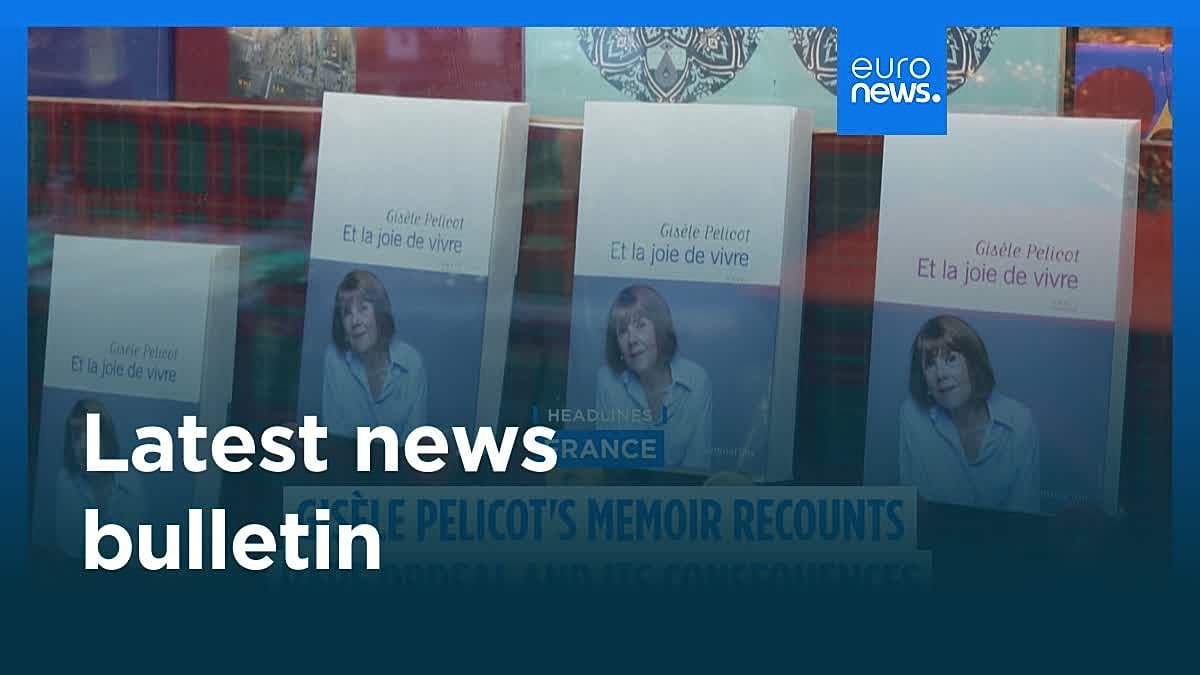The Hitchhiker's Guide to the Galaxy Live is an enjoyable mess

The following contains mild spoilers for The Hitchhikers’ Guide to the Galaxy.
Following its birth as a 1978 BBC Radio sitcom through its many and varied adaptations, Douglas Adams’ The Hitchhikers’ Guide to the Galaxy has become an enduring part of our culture. Despite the fact its satire centers on the anxieties of Britain at the tail end of the ‘70s, its unique wit and surrealism have brought it worldwide fame. It is a rite of passage for at least one subset of British teens and their anglophile cousins, as well as a tech culture shibboleth that has embedded itself in the broader culture. Now, it has been reborn as a live immersive theatre production at London’s Riverside Studios that preserves the series most singular quality: Its messiness.
Given it started as a half-hour radio comedy, Hitchhikers’ plot is surreal, episodic and prone to (what appear to be) digressions. But the broad shape of each version of the story sees Arthur Dent waking up to discover bulldozers about to demolish his home to make way for a new highway. He is distracted from his protest by his friend Ford, who reveals he is not an out-of-work actor, but an alien researcher for a book called The Hitchhikers’ Guide to the Galaxy. Minutes later, the Earth itself is demolished to make way for a new interstellar highway, but Ford and Arthur hitchhike onto one of the ships demolishing the planet.
The “book” itself is in fact a small tablet containing a Wikipedia-style trove of knowledge that acts as the series’ narrator. Still wearing his pajamas, Arthur is dragged across the universe in various adventures which culminate in meeting a group of multi-dimensional aliens looking to discover the ultimate meaning of life, the universe, and everything. Subsequent radio series and novels take the same characters forward, backward and sideways with diminishing returns. Adams’ love of the long shaggy dog joke means that the ultimate question and the ultimate answer is… “What do you get if you multiply six by nine?” “Forty-Two.” (God’s final message to his creation is a similar tale, revealed as “We apologise for the inconvenience.”) 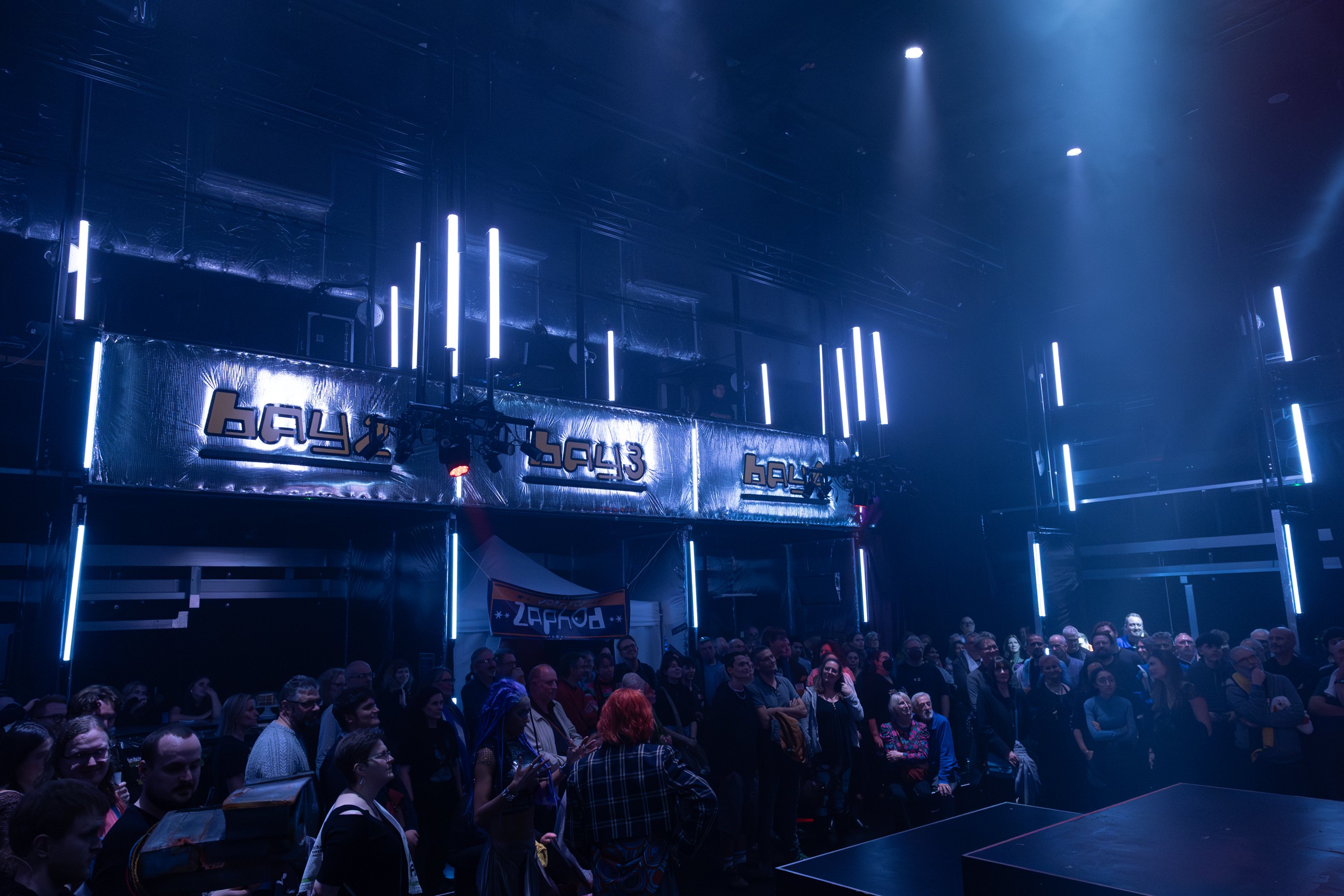
Each adaptation is twisted and turned to suit its new format, so there’s only a handful of essentials. Arthur, Ford, The Book, 42 and the Eagles’ Journey of the Sorcerer (the chorus of which is the theme) are the only mainstays. It should come as no surprise then that generous liberties have been taken here to compress the sprawling journey narrative into a format suitable for a live immersive theatre show. [If you’re unfamiliar, rather than sit and watch the action unfold on a stage, you’re instead walking around an environment with the story taking place in front of you. You can even engage with the actors directly at points, although only if you want to.] Here, you’ll be loitering in the bar of the Horse and Groom pub, the cargo hold of the Heart of Gold, the… cargo hold of the Vogon destructor ship and the factory floor at Magrathea. 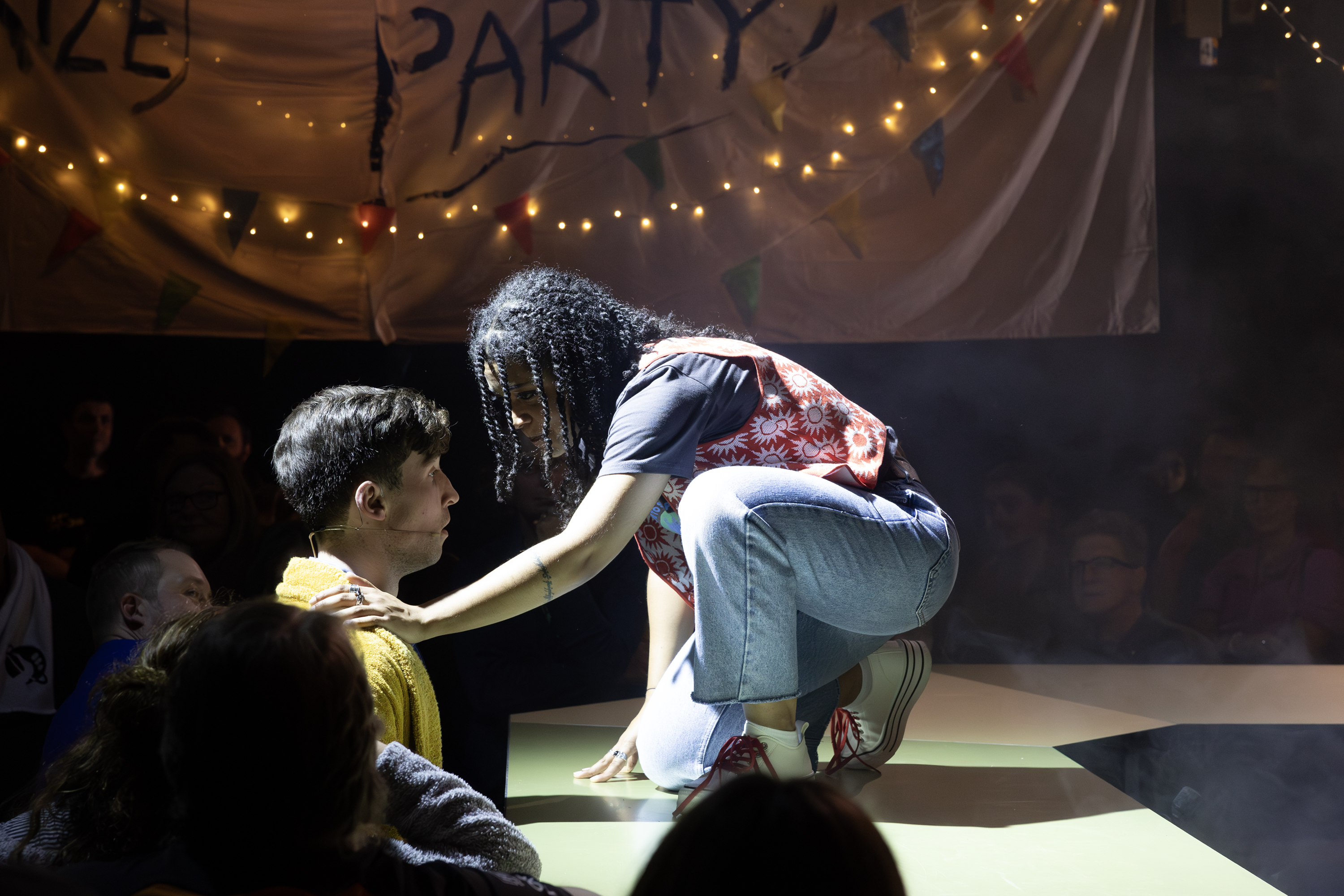
To try and impose some degree of conventional narrative on the story, Hitchhiker’s Live takes the beats of the first story (in all its forms) and the romance from the fourth novel, So Long, and Thanks for All the Fish. We spend most of our time with Ford (Oliver Britten), while Arthur (Robert Thompson) flits in and out of the narrative as part of his universe-spanning quest to reunite with his beloved Fenchurch (Kat Johns-Burke). We get to spend a little time with Zaphod Beeblebrox (Lee V-G) and Slartibartfast (Richard Costello), while (one form of) Trisha McMillan (Lenora Crichlow) only appears as a recorded voice identified with a photo that looks a lot like a publicity shot from Avenue 5 rather than one taken fresh for this show. 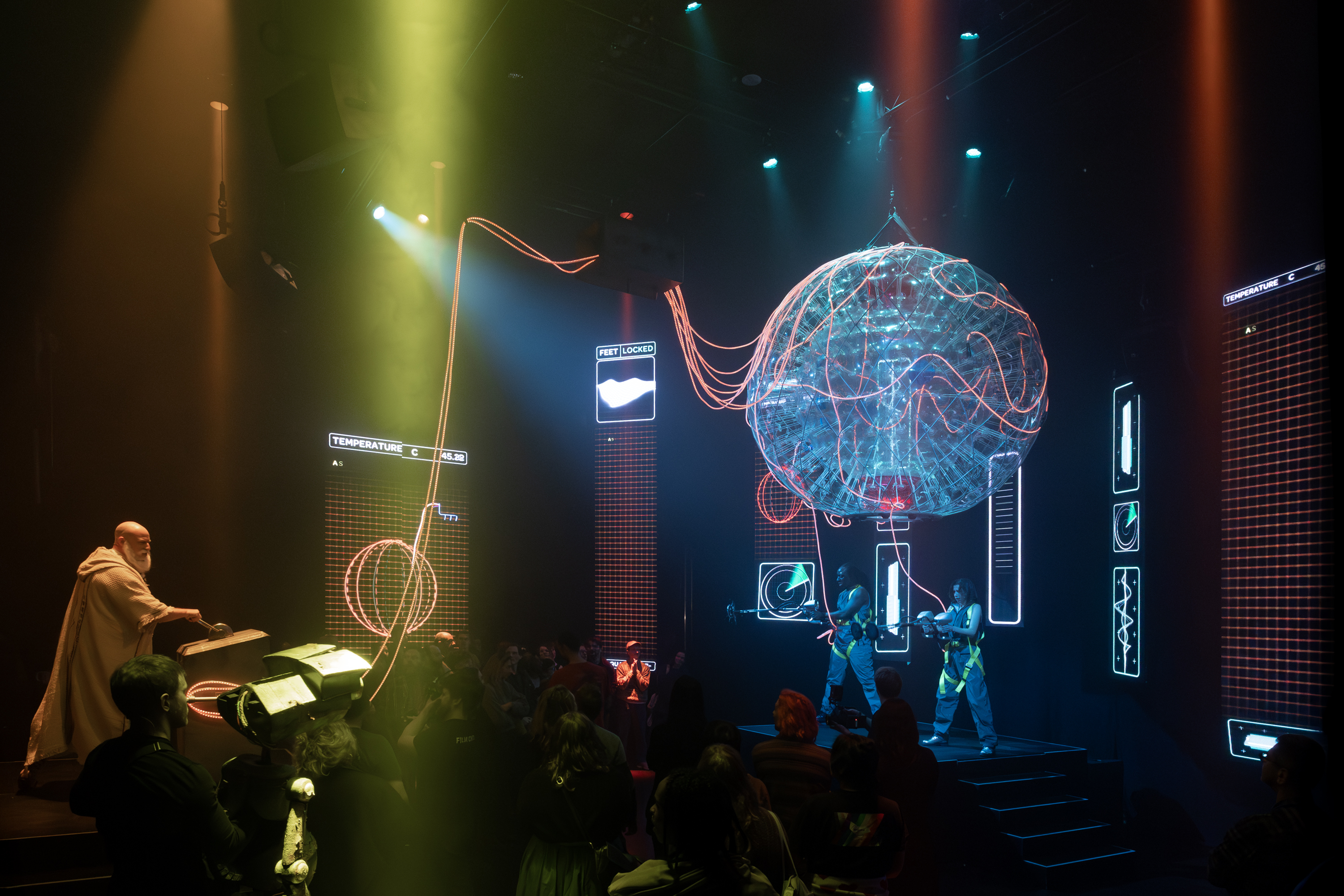
Hitchhikers’ digressive surrealism means it struggles against the limits imposed upon it by any and every medium it’s ever been made into. As someone who grew up with the novel version, I see that as definitive, but even the later works struggled to remain on the page. At times, the immersive theatre format works to the story’s detriment, meaning you’re likely to miss a beat or two if you’re not able to sprint to every corner of each scene. For instance, there were so many audience members gathering around the Jatravartids area that I thought I’d check out the emptier areas first. Which was a mistake, as Humma Kavula then engaged in a big song and dance number center stage that I’d missed the buildup for. Similarly, I didn’t even realize that the show featured Wowbagger the Infinitely Prolonged (Tom Bowen) until I read the cast list while writing this review.
The abbreviated nature of the storyline means you’re often missing not just the connective tissue but even a lot of the meat from the original. Some of the emotional weight of the set pieces feels unearned because the makers have elided a lot of the necessary everything. When you get to the big finish, it’s hard not to wish we’d seen some of the effort one character has made beyond their hair growing out to mark the passage of time. The more I watched the show, and its many musical numbers, the more I wished its creators had simply made a more traditional stage musical. It would have made for a smoother, more cohesive show, especially given the source material’s thematic and narrative complexity. 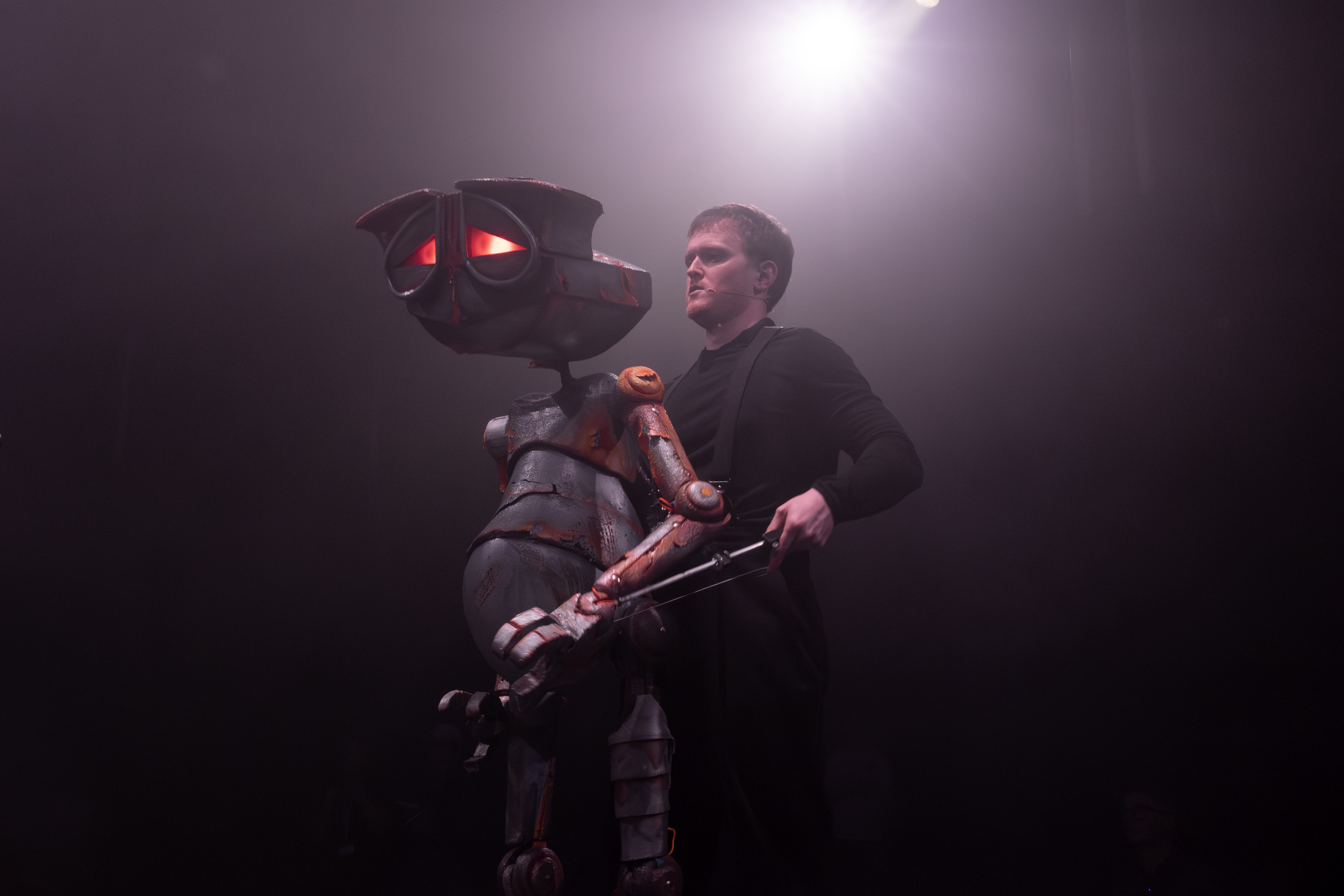
The immersive format does have its strengths, including the ability to pepper the set with little visual jokes. The Vogon Complaints Office is packed full of gags hidden in boxes and filing cabinets, as are the little references on the screens in the Horse and Groom set. But best of all is any and all time you get to spend with Marvin the Paranoid Android (Andrew Evans), a masterful mix of design, acting and puppetry. Rather than cram Evans into a suit, the actor has the beautiful Marvin puppet on a chest harness, giving it a fluidity of motion and expressiveness that previous versions could only dream of. It helps, too, that Marvin’s perpetual misery beautifully undercuts the more saccharine parts of the story.
I also need to heap praise upon the guide segments, both in their animation style and for Tamsin Grieg’s narration. I’d say Grieg (Black Books, Episodes) is the true heir to original voice Peter Jones’ crown, bringing a perfect blend of voice-of-God exposition and dry undercutting. In fact, you’ll struggle to find a bad element in the whole production, especially in the well-choreographed set pieces where the cast acts against pre-recorded footage. It’s a technical marvel in several ways and it is obvious that every person involved in its creation is operating with a bottomless pit of love for the source material and Adams. It’s just that all of those elements don’t quite cohere enough to push the show from good and entertaining through to being a must-see.
Consequently, I’d say if you’re local to London and are even vaguely familiar with Adams’ work, you should go and enjoy yourself. But I might warn Adams devotees from further afield they may find the production underwhelming if they’re making a big trip to go and see it. Like every other Hitchhikers’ adaptation, it’s a mess, but then the messiness has always been at least half the point.
This article originally appeared on Engadget at https://www.engadget.com/entertainment/the-hitchhikers-guide-to-the-galaxy-live-is-an-enjoyable-mess-140000853.html?src=rss





















